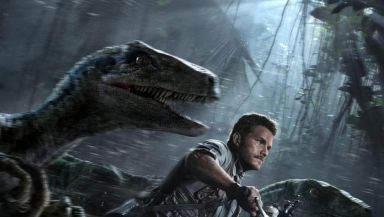
It's getting harder to dazzle people. In an age of computer-generated wonder and paralysing consumer choice, it's not easy to generate moments of awe and wonder in audiences. That's the challenge faced by Jurassic World, the long awaited fourth instalment in the dinosaur-on-the-loose franchise kicked off by Steven Spielberg 22 years ago. At the time, Jurassic Park was pretty much the biggest blockbuster ever – an eye-popping display of special effects which left audiences barely able to believe what they were seeing.
Two decades later, such reactions are much less common. And the great news – the answer to the question on every film fan's lips, is that Jurassic World delivers – and then some. It is truly spectacular, properly thrilling. It's far and away the best Jurassic Park since the original, and it really, really needs to be seen on a big screen.
In addressing its own problem of audience-wonder-fatigue, the film presents us with the story of people wrestling with exactly the same issue. On the remains of the original theme park, a rich benevolent billionaire has built a bigger, better version of the ill-fated attraction, and as we join the story, business is booming. Overseen by the uptight, career-obsessed Claire Dearing (Bryce Dallas Howard), the park is constantly responding to the demands of the market by engineering bigger, scarier, toothier dinosaurs through an ethically murky genetics programme. Their approach is questioned by many, including heroically waistcoated Owen Grady (Chris Pratt), a velociraptor trainer who sees the creatures as animals, not 'assets'.
Of course, something goes wrong, and action-packed adventures ensue. Key to what follows are the exploits of the newly-engineered Indominus Rex, a gigantic designer Tyrannosaur+ with all sorts of extra DNA added in. Once we meet her, the film barely goes a minute without another high-octane thrill, yet impressively manages to develop characters, tell a proper story and explore some bigger ideas. It's a whole lot of fun.
Yet of course, for some Christians, the very mention of dinosaurs is enough to bring the cultural shutters down. They may feel that a creationist worldview is incompatible with that of the Jurassic Park films. If that's you, then this helpful infographic from evangelical publisher the Good Book Company reveals that you have nothing to worry about; as it turns out, dinosaurs are pretty relaxed about your theology.
We should never feel threatened by fantasy stories. The Jurassic Park films don't expect us to really believe all this is possible – they have always been about a suspension of disbelief in the pursuit of spectacle. Instead, fantasy films create a different canvas against which to set some of our big questions. So at its heart, Jurassic World is film about the dangers of playing God – a cracking theme for any theologian to play with – and the realisation that we can't even attempt to do so without some serious consequences. In this regard, perhaps the most interesting line comes from the theme park's billionaire owner Masrani: "The key to a happy life is to accept you are never in control."
Alongside all the action – and, parents should be aware, not a small amount of blood – there's also time to explore issues of personal priority, military morality, and even animal welfare. It also delivers some brilliant nods to the original movie which will thrill fans, and is underpinned by an intelligent script which either avoids action movie cliches or subverts them. As part of that, it also delivers in Howard and Pratt a pair of romantic leads who don't conform to the usual gender stereotypes.
That it manages to deliver so much entertainment without being mindless is perhaps its greatest triumph. So let's not get bogged down by a creationist red herring. It doesn't matter what your theology tells you about dinosaurs – Jurassic World is fantastic fun, and much more thought-provoking than you might reasonably expect. In spite of the high bar for such things, it's a summer blockbuster which truly delivers. One can only imagine what lengths they'll have to go for the next sequel...
Martin Saunders is a Contributing Editor for Christian Today and the Deputy CEO of Youthscape. He' is co-hosting the Youth Work Summit on June 20. You can follow him on Twitter: @martinsaunders













